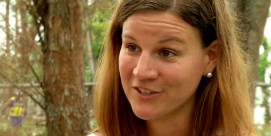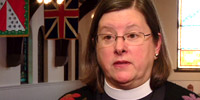In This Episode << SLIDE LEFT TO SEE ADDITIONAL SEGMENTS
Bearing One Another’s Burdens
by Tonya D. Armstrong
Since its inception 10 years ago, the ministry of congregational care and counseling at Union Baptist Church in Durham, North Carolina, has made Stephen Ministry a vital component of its continuum of care.
 “The Good Samaritan” by James Lesesne Wells (1902-1995) |
Union—a thriving, predominantly African-American congregation of about 4500 members—enrolled in Stephen Ministry in the spring of 2000 and sent me to a leadership training course in Orlando. When I returned to North Carolina, I conferred with Union’s pastor, Kenneth R. Hammond, and began recruiting additional Stephen leaders from the church. Six months later, Union’s first Stephen Ministry class began with nine trainees.
One of the most appealing aspects of this model of ministry is its ability to balance attention between both the spiritual and emotional needs of care receivers. Stephen Ministry trainees receive 50 hours of preparation over four months in areas such as listening non-judgmentally, managing care receivers’ feelings, practicing assertiveness, establishing boundaries, observing confidentiality, and recognizing the limits of the care they can offer. These practical skills help to establish a trusting bond between the Stephen minister and care receiver, and they also provide a superb foundation for the care receivers themselves to cope with challenging circumstances in their lives.
Because Stephen Ministry trainees are encouraged to establish prayer-partner relationships with one another, they too are formed spiritually by their work. Specific training on using scriptures when providing care and identifying ways that Christ cared for others augment the spiritual experiences Stephen ministers have as they devote themselves to what is a two-year “calling.” While Stephen Ministry is unapologetically Christ-centered, it allows space to accept care receivers at their specified point of need, which often is not articulated as faith-based. Stephen ministers can openly reflect their own Christian identity without proselytizing.
Stephen Ministry is well-suited to our congregation in Durham for theological as well as pragmatic reasons. It recognizes the inherent value of the laity in ways that have not always been emphasized historically. While traditional models of pastoral care stress the role of the pastor in shepherding the flock, Stephen Ministry complements the pastoral role by equipping the laity to work alongside the pastor and provide care to the hurting. This is especially meaningful to individuals who require ongoing attention in ways that are challenging for pastors, who often must move from one crisis to another. Stephen ministers offer countless hours of care that meet real needs. They embody what they believe is a responsibility for the hurting that is shared by clergy and laity alike.
Shared responsibility is a central scriptural and theological emphasis of Stephen Ministry, which encourages Christians to “bear one another’s burdens, and so fulfill the law of Christ” (Galatians 6:2). Such biblical wisdom runs counter to the messages of North American Christianity and culture, where individualism and autonomy often reign supreme. Stephen Ministry, in training and in practice, teaches the laity valuable skills for how one bears another’s burdens without ever losing sight of one’s own burdens (particularly as lay leaders share them in biweekly supervision sessions and the prayer-partner relationship).
Union’s Stephen Ministry has partnered with other ministries in our own congregation (the diaconate ministry and women’s ministry, for example) to provide education and skills to their members. It has also served our local Durham community well in multiple ways. Whenever we experience a lull in requests for care from members of our own congregation, we are able to assign Stephen ministers to organizations in the broader community. Our church has forged relationships with local homeless shelters, social service agencies, nursing home facilities, and their individual members and constituents. We have established a deeper sense of partnership and community with several local churches, collaborating on Stephen Ministry training for the past five years with Duke Memorial United Methodist Church, St. Philip’s Episcopal Church, White Rock Baptist Church, the Congregation at Duke Chapel, Aldersgate United Methodist Church, and Westminster Presbyterian Church. This ecumenical fellowship has resulted in more efficiency in our training efforts, ready referral partners across churches, greater understanding of and respect for other denominations, and ongoing relationships with Stephen leaders and ministers that extend well beyond the training season. The Triangle Area Stephen Ministry Network has provided resources and continuing education opportunities with our counterparts in Raleigh, Durham, Chapel Hill, and surrounding areas as well.
While there are aspects of Stephen Ministry that can be improved, such as greater multicultural sensitivity in training materials and more attention to meeting the needs of youth (who are not served under the current Stephen Ministry model), we remain convinced that it has greatly enriched the quality and quantity of care we provide to church and community members alike.
One of the most powerful narratives of the New Testament is the parable of the Good Samaritan (Luke 10:25-37), where the “ordinary” Samaritan lay person (rather than a member of the clergy) demonstrated care and compassion for the victimized Jew. Instead of resorting to overly spiritualized discourse, the Good Samaritan responds to the victim’s multilayered needs in a manner that brings healing and provides encouragement. This narrative underscores the importance of meeting the needs of the oppressed and marginalized in tangible ways. It broadens our understanding of who our neighbor actually is and illustrates what it means to show mercy. Most importantly for Stephen Ministry, the parable of the Good Samaritan affirms the tremendous value of the laity in joining God’s healing work, beginning with our immediate communities.
Tonya D. Armstrong is the minister of congregational care and counseling at Union Baptist Church in Durham, North Carolina, and adjunct assistant professor in pastoral theology at the Duke Institute on Care at the End of Life.







